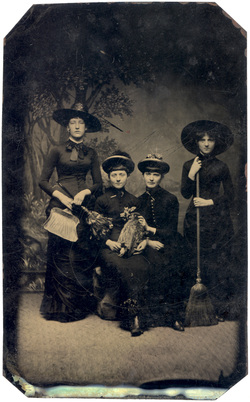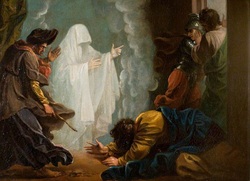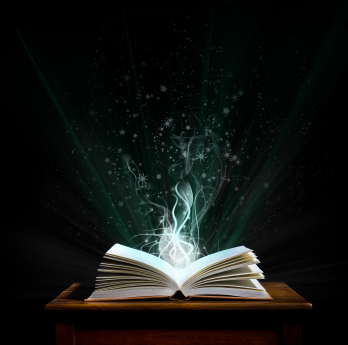
The movie begins with a montage of faux newspaper clippings chronicling the eponymous siblings' famous exploits defeating legendary evil witches. These were drawn in the late medieval woodcut style (never mind the anachronism; there were many more) and meant to refer visually to the Germanic fairy tale collected by the Grimm brothers. Again, entertaining, but these images included so many of the stereotypes that clearly survive in the popular imagination - broomsticks, cauldrons, black cats, and many far darker. The evil witches were portrayed as ugly old crones, with long crooked noses, rotten teeth, moles, and goat's horns. I said to my husband, "This will be an interesting sociological study, as well as a movie."
Most of this imagery descends directly from one of the world's worst examples of hate literature, the Malleus Maleficarum, the Hammer of Witches. Essentially, it was a witch hunter's handbook, a do-it-yourself manual on how to identify witches, refute claims of their innocence, and prosecute them to the point of capital punishment. Published in 1487, it was a bestseller of its time, and although today we might laugh at its logic and dismiss its arguments, it was responsible for the torture and deaths of thousands of people.
In Hansel & Gretel: Witch Hunters the lead characters end up discovering that their own mother was a witch, but of course a "white witch." They vow to continue to hunt down and kill any other kind at the movie's end, and presumably they do. Theirs is a simple world: save good, kill evil. The killing might be messy, but the morality isn't.
Here's where the sociology bit comes in: the movie Hansel and Gretel never wonder why any of the evil witches turned to the dark arts. They never consider why these women - and they're ALL women - are living alone in the forest. They never ask what, exactly, divides good witchcraft from bad witchcraft. Sure, fattening and eating children is bad, but what's the metaphor? What's really going on in the original tale collected by the Grimms?

The inherent ambivalence of magic is what worries people, I think, whether they believe in it or not. In folklore and literature, magic can go either way, good or bad, healing or hurting, wise or vindictive. Real or simply imagined, magic comes from some secret place in the unconscious mind. It's connected with birth/death/rebirth, and with forces that aren't understood. Magic and religion are often intertwined (in the fictional universe I've created for Isadora and her family, they are one and the same), and both require belief in something supernatural, literally "above nature," in order to be felt and/or explained.
Because of the ambivalent nature of magic, or , many people want to condemn it out of hand, and use images and "evidence" such as that espoused in Malleus to justify their position. I get that; it's easy to fear what we don't understand. But here we're treading on dangerous ground. The term "witch hunt" is still used today, to describe a systematic effort to root out and eradicate individuals from within a group, for false, overblown, or selfish reasons.
There has been a ton written on what motivated the witch hunts in early modern Europe and America, so I'll simply refer you to other writers if you're interested. I'm going to focus on the very basic question of whether it's a good idea to buy into stereotypes, especially those that, frankly, endanger women through their implicit misogyny. Take the Witch of Endor, who appears in 1 Sam 28: 3-25. For centuries, calling someone a "new witch of Endor" was tantamount to calling her (always her) evil incarnate. For those who don't know the story, the witch is a necromancer, someone who supposedly can communicate with the dead to receive divination. King Saul, having failed to receive divine instruction in his dreams or through the official priests, wants to know what to do about an imminent invasion by the Philistines. He goes in secret to the witch, who summons Saul's old advisor, the prophet Samuel. Samuel gets mad at being disturbed, tells Saul that his army will be defeated and he and his sons will die, and berates the king for disobeying God. In the Biblical account, Saul gets the blame, not the witch. Yet, over time, the popular interpretation of the story changed, to one in which Saul is at fault, but the witch is truly evil. Why? Because single women living alone were - and perhaps still are - considered at the edge of society, unnatural, suspicious, and of course vulnerable. When in doubt, blame the woman, Malleus suggests.
Today there aren't many true witch hunts, thank heavens, but I would like to caution everyone to think carefully about rushing to judgement. Just as I'm sure you agree that a long nose or crooked teeth don't make someone evil, neither does the fact that we know better make us immune to stereotypes and assumptions. It's always smart to take a second look, and ask ourselves if we're seeing reality or our own prejudices.
Peace, everybody!

 RSS Feed
RSS Feed